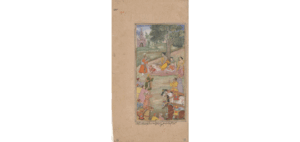Bharata Invites Rama to Return
After the funeral ceremonies in honor of Dasaratha, Bharata consulted with his brother Satrughna and the court sages. During the interview, Satrughna could no longer contain himself and wanted to throw himself on Manthara to kill her, but Bharata prevented him.
On the morning of the fourteenth day after Dasaratha’s death, Bharata announced his departure. In front of the crowd gathered around the palace, he communicated to everyone that he would go to look for Rama, and that he would bring him back to Ayodhya. The citizens were very happy with that wise and virtuous decision and felt the rebirth of hope.
The preparations for the departure began immediately. Bharata brought with him a massive army and also his mother, Manthara and the other wives of Dasaratha. The chief ministers and the court sages also went with them.
They retraced the same path that Rama had taken not many days before, until they reached the hermitage of Rishi Bharadvaja. The sage entertained the entire army, providing food and shelter thanks to his mystical powers. After having refreshed them, Bharadvaja wanted to know their intentions.
“Young Prince Bharata,” he asked him, “what are your intentions towards Rama? I hope you have no bad intentions, because you would be committing an unholy action.”
In a humble tone, Bharata recounted everything that had happened in great detail.
“Oh, great sage,” concluded the good prince, “do not think that the plot was hatched with my approval. I was oblivious to everything and far from Ayodhya. Don’t believe that I have come this far to destroy the one who could become a danger to my power. It is the opposite. I have come to bring my beloved Rama back to Ayodhya and to give him back what is rightfully his. The perpetrators of the crime are this treacherous woman, my mother, and her unworthy servant, Manthara.”
“I am glad to know that you have no bad intentions towards Rama,” said Bharadvaja. “You can be sure that otherwise I would have cursed you. Rama is in Citrakuta, you will find him there. As for your mother, don’t hold a grudge against her. I can assure you that she has only been the instrument of a divine will that will ultimately benefit everyone.”
After a little more conversation, Bharata respectfully greeted the sage and headed for Citrakuta.
The army immediately moved to the right bank of the Ganges, and Citrakuta soon became visible. Bharata stopped the army and decided to proceed on foot, accompanied by a few others.
At that moment Rama had noticed a great cloud of dust on the horizon and was alarmed.
“Laksmana!” he called, “look at that gigantic cloud of dust and listen to that turmoil very similar to that of horses and elephants. An army is approaching. Maybe he’s an enemy king. Climb a tree and find out what the origin of this agitation is.”
Quickly, Laksmana climbed a tree and scanned the horizon. He realized that it was indeed an army and recognized the insignia of the Bharata militias.
“Rama!” he cried agitatedly. “Indeed, a danger is approaching! It is Bharata’s army! Here is his diabolical plan: first he moved his mother against you and robbed you of the kingdom, and now he wants to kill you to enjoy it in peace.”
There was almost joy in Laksmana’s voice, the bitter joy of impending revenge.
“Let’s get ready to fight. Today the traitorous brother will know the price that those who commit evil deeds must pay. Today is the last day of his life.”
Rama was serene, almost smiling.
“Don’t think so badly of Bharata. I’m sure he’s not to blame for what happened. Certainly it was all Kaikeyi’s doing.”
Bharata found the hut where his brother lived. He saw him sitting with his bow in his hands, dressed with simple hermit clothes, and giving off a light of glory. His joy in seeing him had no limits; those who witnessed that emotional scene shed warm tears.
The brothers sat down.
“What is happening in Ayodhya?” Rama asked. “I hope everyone is in good health and happy under the rule of a king as righteous as my father.”
At those words Bharata felt overwhelmed by pain and could not reply immediately. Rama looked at him anxiously. The brother’s desperate expression spoke for itself.
“Our father, the virtuous King Dasaratha,” he then replied, “has ascended to the higher planets, unable to bear the pain of being separated from you.”
Rama was struck by that news. He hid his face in his hands and wept bitterly. For a long time, no one spoke.
“Now the kingdom of Ayodhya has no king,” Bharata continued, “and you are the heir by right. The people need you and are waiting for your return. I know you promised our father to stay in the forest for fourteen years, but now he’s dead. Go back to Ayodhya, and I will take your place here so that our father won’t have to suffer for not being able to keep his commitment.”
A flash of indecision shone in Rama’s eyes.
“No,” he replied. “I promised our father that I would stay in the forest for fourteen years, and so I will. Go back to Ayodhya and rule in my place. “When that time has passed, I’ll come back and take the throne.”
The insistence was useless. Rama did not want to return.
“I knew you wanted to keep the vow,” Bharata said finally. “So if you really don’t want to come back, at least wear these sandals I brought. They will be placed on the throne and I will rule in your name, living in a hut on the outskirts of the city.”
Rama agreed and shortly after, Bharata took the path of return. But his heart was swollen with sadness.
This is a section of the book “The Ramayana”, in English.
To buy the complete book, click here




Leave a Reply